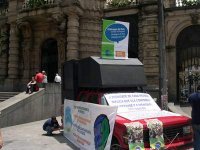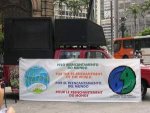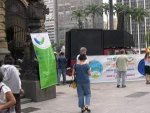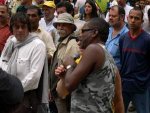

Publié le 16 novembre 2005
Traductions disponibles en :
Español (original) .
Português do Brasil .
français .
Street Dialogues : History, Methodology, Practice
par Hamilton FARIA
Thèmes généraux liés :
Communication .
Éducation .
This document presents the "Street dialogues", their history and methodology to put them in practice, on the basis of the experience of 23 dialogues that were organized during the WSF in Porto Alegre, Brazil, in January 2005, within the 11 Thematic terrains : 22 Street Dialogues (2 in each thematic terrain) and 1 online virtual Dialogue between Porto Alegre and Paris, France (coordinated by Marina Urquidi).
In the contemporary world the precariousness in the communication among the people and in the conviviality among collectivities hinders the quality of life and human development. In a virtual world reconsideration of face-to-face relationships becomes fundamental to learn to live together. The idea that is behind the "Street Conversations" is to tighten the contact with the collectivity, to form communities of emotion and to develop true education to listening. Below is presented the history of these Street Conversations and a methodology for their implementation
History
The history of the street dialogues began at the end of the eighties in São Paulo, when Municipal Secretariat of Culture developed activities of public classes, involving university teachers and distinguished persons to give conferences in public places for citizens, mainly those who suffer social exclusion.
This idea was transformed by the Intermunicipal Culture Forum - the FIC which, in 1996 accomplished public conversations in squares on several themes : racism, human rights, drugs, food, etc. People were moved and expressed themselves giving depositions, crying, singing. There was even street residents’ involvement, alcoholics, seniors, etc.
The objective was that the cultural event should also be accomplished outside of the consecrated places.
In 2000 the São Paulo Group of the Alliance for a Responsible, Plural and United World accomplished that activity, which was to be called "Street Conversations", in front of the Municipal Theater. Thousands of people participated in a conversation about the Renewal of Politics.
Throughout 2001 the Alliance accomplished in a square of the Vila Madalena, São Paulo, ten street conversations, and from that moment, that activity started to happen at least once a month, in squares and public places.
In the year 2003, in Porto Alegre during the Thirds World Social Forum this activity was accomplished with the participation of people of several continents. The street conversations started to be part of the cultural actions of the Forum, happening simultaneously in seven neighborhoods of the city on the theme Peace, Democracy and Diversity.
In 2005, the street conversations, with the name "Street Dialogues", integrated the new methodology of the Fifth Forum, more dialogue-oriented and cross-cultural.
The Charter of Human Responsibility, especially the 10 principles printed in big banners was diffused during The street dialogues that happened in the eleven Thematic Terrain of the WSF, facilitated by members of the Alliance for a Responsible, Plural and United World.
The entities and networks that have been participating in the conception and implementation of the street conversations in Brazil are : Pólis Institute - Training, Consultancy and Research in Social Policies, Institute of Relational Politics, Instituto Ágora in Defense of Voter of Democracy, Intermunicipal Culture Forum - FIC, World Network of Artists in Alliance, World Drums of Peace Movement, Cives - Brazilian Association of Entrepreneurs for Citizenship, NGO Shalom Salam Paz, IPAZ-International Peace Agency, COMPAZ, GT Cultura FSM, Crescente Fértil, Instituto Ecoar, Women’s Education Network - entities and movements that are part of the dynamics of the Alliance for a Responsible, Plural and United World Network in Brazil.
Objectives of the street dialogues
![]() To rescue and to motivate cultural, human and democratic dialogue with the population, seeking the exercise citizenship, promote speaking in public spaces.
To rescue and to motivate cultural, human and democratic dialogue with the population, seeking the exercise citizenship, promote speaking in public spaces.
![]() To know and to interact with the daily reality of the population providing the culture of democratic dialogue
To know and to interact with the daily reality of the population providing the culture of democratic dialogue
![]() To stimulate the intercultural process promoting dialogue among different people
To stimulate the intercultural process promoting dialogue among different people
![]() To circulate human values of peace, diversity, solidarity, responsibility
To circulate human values of peace, diversity, solidarity, responsibility
![]() To stimulate the creation of public politics
To stimulate the creation of public politics
![]() To wake up creative living and the re-enchantment of the world through art
To wake up creative living and the re-enchantment of the world through art
Global Methodology
1 - To hear the population in the squares, streets, preferably points of great gathering where people circulate coming from the most precarious sectors
2 - To try to understand and to reveal the knowledge of the common people
3 - To stimulate dialogue through artistic-cultural manifestations, showing the importance of art in the formation of communities of emotion. These manifestations can be varied : music, street theater, mamulengo, dances, line, poetry, story telling, etc.
Implementation methods
Each street conversation needs a mobilization process in the neighborhood or community where it will develop, which presupposes the formation of partnerships and the organization of leaderships and entities of each area, before each event.
At the same time, popularization should happen through pamphlets, strips and means of communication, before and after each event.
That activity also demands the presence of a facilitator or couple of facilitators, preferably in balance of gender, who make the mediation of the speech, they provoke the themes, they summarize the participants’ thought asking questions on the varied themes : peace, public politics, human rights, food, health, violence, art, politics, etc.
For this, before each street conversation there should be a training of at least 2 days, with the participation of the facilitators, coordinators and 2 people who take the responsibility for recruiting the artistic-cultural part, mobilization and popularization.
The conversations should be documented with pictures, video and also with the production of a publication where the whole experience will be told.
Practice





